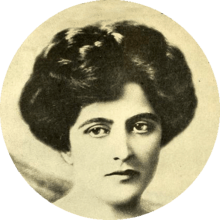Maxine Elliott
| Maxine Elliott | |
|---|---|
 Maxine Elliott, circa 1917. | |
| Born |
Jessie McDermott February 5, 1868 Rockland, Maine, U.S. |
| Died |
March 5, 1940 (aged 72) Cannes, France |
| Occupation | |
Maxine Elliott (February 5, 1868 – March 5, 1940) was an American actress and businesswoman.
Biography
Born Jessie McDermott on February 5, 1868 to Thomas Dermot, a sea captain and Adelaide Hill, she had one sister Gertrude and at least two brothers, one of whom was a sailor and lost at sea in the Indian Ocean.[1] By age 15 in 1883, Jessie was seduced and made pregnant by a 25-year-old male whom she may have married underage according to her niece's biography. She miscarried or lost the baby. This incident left a psychological wound on Jessie for the rest of her life. What became of this first husband is unknown. Jessie adopted her stage name Maxine Elliott in 1889, making her first appearance in 1890 in The Middleman. In 1895, she got her first big break when Augustin Daly hired her as a supporting actress for his star player, Ada Rehan. After divorcing her first husband, Elliott married comedian Nat C. Goodwin in 1898. The two starred together at home and abroad in such hits as Nathan Hale and The Cowboy and the Lady.
In a production of The Merchant of Venice, she negotiated a contract for $200 and one-half of the profits over $20,000. She was billed alone when Charles B. Dillingham's production of Her Own Way opened on Broadway on September 28, 1903. From then on, Elliott was a star. When the production moved to London in 1905, King Edward VII asked that she be presented to him. Her younger sister, Gertrude, was married to the English actor Sir Johnston Forbes-Robertson.
Goodwin eventually divorced Elliott in 1908. Around this time she became friendly with financier J. P. Morgan. Some biographers of Morgan claim the seventy-year-old Morgan had a sexual relationship with Elliott but no evidence substantiates these rumours. Assuredly Morgan gave her financial advice of all sorts and she became a rich woman because of this advice. Shortly after divorcing Goodwin, she returned to New York City and in 1908 opened her own theater, The Maxine Elliott, located on Thirty-Ninth Street just off Broadway. She was both owner and manager, and, at the time, the only woman in the United States running her own theater. Her first production was The Chaperon. Elliott experimented with acting in silent films in 1913. In that year, she was in Slim Driscoll, Samaritan, When the West Was Young and A Doll for the Baby, but she soon returned to Britain. She started dating tennis star, Anthony Wilding, in 1913, a man who was over 15 years her junior.
During World War I, Elliott moved to Belgium and volunteered both her income and her time to the cause of Belgian relief, for which she received the Order of the Crown (Belgium). She had planned to marry Wilding, but he was killed on May 9, 1915, at the Battle of Aubers Ridge. In 1917, Elliott returned to the U.S. and signed with newly formed Goldwyn Pictures to make Fighting Odds and The Eternal Magdalene. The odds are against Elliott's films surviving the decades, but evidence points to Fighting Odds surviving in Russia's Gosfilmofond. Elliott can be seen visiting Charlie Chaplin's studios in 1918 and cavorting with him and her entourage before Chaplin's cameras. Her visit to Chaplin survives and usually ends up in omnibus videos on Chaplin.
Elliott's last stage appearance was in 1920 in Trimmed in Scarlett, aged 52. She then retired from acting, announcing that she "wished to grow middle-aged gracefully".[2] As regards her performances, reviewers disagreed "over whether it was her beauty or her acting ability that attracted attention".[3]
Successful in business and investment, Elliott had homes in America and in England. She built in 1932 near Juan-les-Pins le Chateau de l'Horizon, where she entertained such guests as Winston Churchill, Lloyd George and Vincent Sheean;[4]and died on March 5, 1940, in Cannes, France, a wealthy woman, at the age of 72. She was interred at Protestant Cemetery in Cannes. She was the subject of a biography titled "My Aunt Maxine: The Story of Maxine Elliot" c.1964 written by her niece Diana Forbes-Robertson.
References
- ↑ My Aunt Maxine c. 1964 by Diana Forbes-Robertson
- ↑ Id. p. 278
- ↑ Block, p. 277
- ↑ http://www.spectator.co.uk/2016/11/the-french-riviera-a-sunny-playground-for-nitwits/
Bibliography
- Block, Maxine, Anna Herthe Rothe, and Marjorie Dent Candee. Current Biography Yearbook. New York: H.W. Wilson, 1940.
- Maine League of Historical Societies and Museums (1970)
- Maine League of Historical Societies and Museums, and Dorris A. Isaacson. Maine, a Guide "Down East.". American guide series. Rockland, Me: Courier-Gazette, 1970.
- Rockland, Maine's Courier-Gazette, pp. 260–1 (year?)
External links
| Wikimedia Commons has media related to Maxine Elliott. |
- Maxine Elliott at the Internet Movie Database
- Maxine Elliott at the Internet Broadway Database

- Maxine Elliott photo gallery at NYP Library Digital Collections
- Maxine Elliott at Find a Grave
- Maxine Elliott, 1921 passport photo